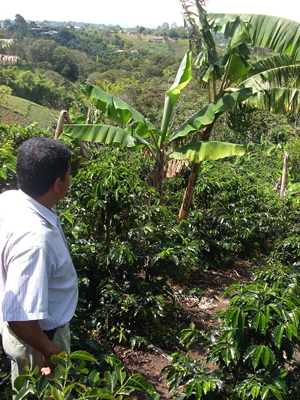From the grounds up, study seeks sustainable 'java'
By Blaine Friedlander

Baristas rejoice! Cornell professors seek to brew agricultural, environmental and economic sustainability together for the world’s smallholder coffee bean growers.
Looking to improve conditions for small farms in Colombia, professors in economics and soil science are examining the entire supply chain – from the tiny producers to the coffee drinkers – to gain insight into consistently delivering quality coffee at a fair price for all.
“I think we’re the first team to measure the environment and biodiversity in a systematic way,” says Miguel Gómez, professor at the Dyson School of Applied Economics and Management. The comprehensive study, funded by the Atkinson Center for a Sustainable Future, will measure the diversity of the fauna, examine the energy, measure the water use and train farmers to pollute less – all to develop a sustainable, viable coffee system.
In a partnership with Gómez, Harold Van Es, professor of soil and crop sciences, will focus on land management. Van Es explains that soil samples will be studied for physical, biological and chemical properties. “We hope to see a relationship between a farm’s soil characteristics and how the farmers manage their land,” he said.

Ximena Rueda, a research associate at Stanford University, will link the biophysical and socioeconomic data, and examine land use for sustainability.
Later in July, graduate students Juan Nicolas Hernandez and Colleen Anunu, (who is a buyer for Ithaca-based Gimme! Coffee) will visit Colombia for six weeks to gather socioeconomic data from small farms and evaluate sustainability factors. Also, the graduate students will measure the impact of economic supply-chain models.
The researchers will partner with Sustainable Harvest Coffee Importers, who use the up-and-coming Relationship Coffee Model, or RCM. This model offers roasters and small farmers the opportunity to establish a direct, long-term trading partnership for high-quality coffee. In return for the strong relationship, the farmers earn a sustainable fair price in the market – and RCM is less vulnerable to market fluctuations, says Gómez.
Small farms can become fair-trade certified (a different model), but must pay to participate. Many small farmers – who have two acres or less and earn less than $6,000 a year – can’t afford the fair trade certification fees and are thus impeded from participating.
Said Gómez: “Specialty coffee is becoming more like wine. High quality will get you good prices.”
Media Contact
Get Cornell news delivered right to your inbox.
Subscribe